The Kolektif, a Film Distributor for Independent Film
Murata: The Kolektif was very instrumental in helping us gain the screening rights for many of the films in this program. Meiske, can you tell me a little bit about it?
Meiske: The Kolektif is basically a distribution platform for independent films that I initiated in 2013. I've been working as a film producer for a long time and also been involved in screening programs as an individual. But in 2012, when I was planning to hold screening programs of Postcards from the Zoo (2012), which Edwin*5 directed and I produced, in ten cities in Indonesia, I was faced with an obstacle: these cities and communities were not equipped with the background―both facility-wise and staff-wise―to organize screenings. And, as an independent producer, I have to work on the film distribution myself―I don't go through the network of commercial cinemas and large-scale cinema complexes―so, at the time confronted with such a situation, I remember thinking how can a producer like myself promote films if the communities are not able to conduct the film screening well.
That was the first idea of Kolektif―to connect the filmmakers with the communities. You see, most of the filmmakers are based in Jakarta and Jogja so there is very little contact between the communities; if someone did want to organize a film screening you would have to ask a friend, who would then ask another friend, who would then ask another et cetera. There would be so many in between. I, on the other hand, am fortunate to already know these people because I'm also part of the filmmaking community. So the Kolektif can shorten the distance between the communities and filmmakers.
*5 Director born in 1978, in Surabaya, Indonesia. Selected short films include A Very Slow Breakfast (2003), Kara, anak sebatang pohon [Kara, the Daughter of a Tree] (2005), Trip to the Wound (2008), and Someone's Wife in the Boat of Someone's Husband (2013). Directed feature films include, Blind Pig Who Wants to Fly (2008) and Postcards from the Zoo (2012). Postcards from the Zoo is the first Indonesian film to compete at the Berlin International Film Festival (2012).
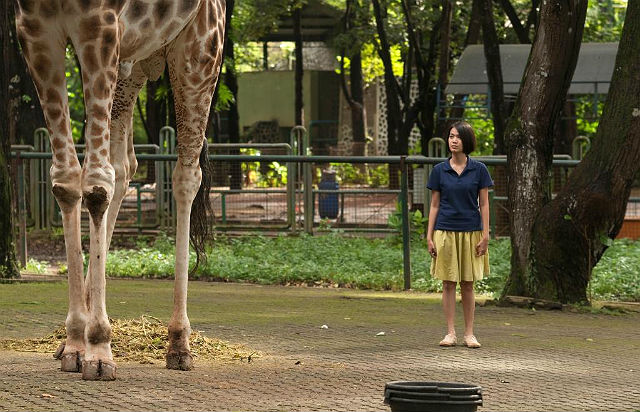
Meiske: The Kolektif can mediate between independent filmmakers and copyright holders to negotiate for the screening rights to better reach these communities for film screenings in the future. In the beginning, in 2013, we were only distributing films that I had produced but then we expanded the scope to my friends' films, and now we have a network of film distribution across Indonesia.
Sadly in Indonesia, however, independent films are misunderstood as being for non-commercial purposes; in other words, the majority of people think that they are free to watch. I have to disagree with that. For Blind Pig who Wants to Fly (2008) which is the first film I produced, everyone asked for a film screening so I just did it without thinking too much; I just screened it everywhere for free. But when I was planning to have screenings of Postcards from the Zoo, I remember thinking, "We will not survive if we keep on screening like this free of charge." So starting with Postcards from the Zoo I no longer wanted to screen our films for free which became one of our missions at Kolektif: to redefine people's awareness that film screenings are a charged event.
We share the revenue between the filmmakers and community-organizers, and I think it was important that we made such a platform. I admit, in the beginning, we faced a lot of resistance because people are used to having free screening programs for independent films, but slowly they got more and more used to it, and even for small-scale film screenings, charging the visitors has become the standard. So I am very happy and proud of this change.
To actually organized and hold film screenings, a bit of revenue is a must. Even for a film screening for, say, fifteen or twenty audiences―so much smaller than the Athénée Français―it's not the number of seats we have to fill, I think it is rather about the principle. To sustain film screenings in the community, thinking about the income and what you can do with it next is indispensable.
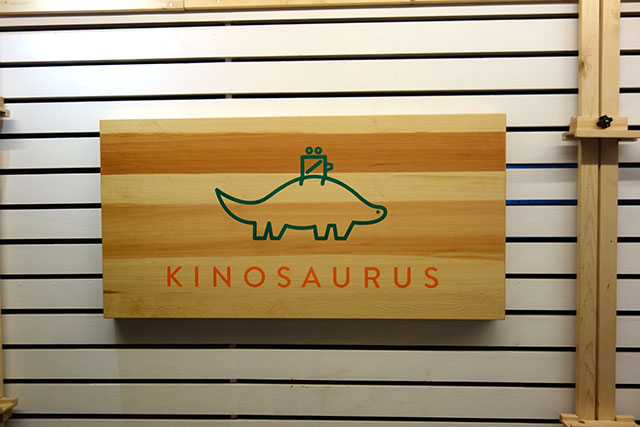
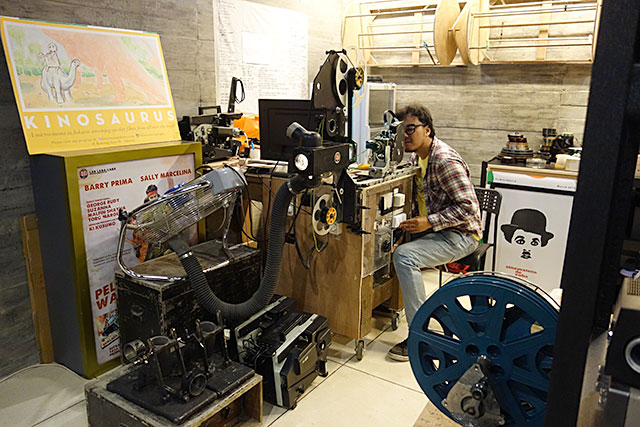
Jakarta's Micro-theater, Kinosaurus
Murata: Tell us about Kinosaurus. How did that begin?
Meiske: Edwin and I had always been saying let's make our own space, and he found a space for us. We opened Kinosaurus in December 2015. At the time, the PFN had closed and we had to find a new space to run Lab Laba Laba.*6 He found the space, but the rent was too expensive to use just for Lab Laba Laba so we decided to have a screening room and use the revenue from the film screenings to run the space. In other words, we made a multipurpose space which we ran and manage ourselves. That's why Kinosaurus is more of an art space: we have workshops for kids, teenagers, and even for adults, the screening space, Lab Laba Laba, and also a coffee shop next door. Kinosaurus is our answer to designing a space which you can continue to manage well; to manage our own space, through our own means, using our own revenue.
*6 A "lab" that conducts research on archival film footages and creates artworks using film and photography. Members include Edwin, Meiske Taurisia, Rizki Lazuardi, among others. The name is derived from "laboratory" and laba laba meaning spider in Bahasa Indonesian. Lab Laba Laba presented their installation at the Old Nishimura Photo Studio for the 2015 Yamagata International Documentary Film Festival.
Murata: What kinds of people come to see films at Kinosaurus?
Meiske: That really depends on the film. But generally speaking, our visitors are young; some may be in university or who have just started working, like those in their early to mid-twenties. We also get visitors who have lived abroad. We generally get visitors who are into independent films.
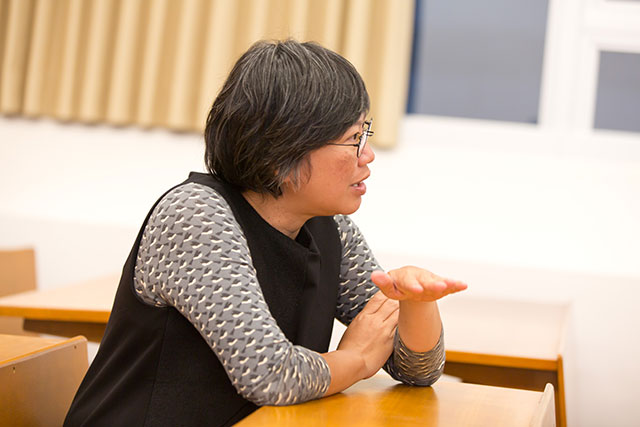
The Kolektif and Kinosaurus: Working Together for Film Programs
Murata: Can you tell us how the Kolektif and Kinosaurus are related? How do they work in tandem?
Meiske: Kinosaurus is completely separate from Kolektif. Kinosaurus run their own film programs, and the Kolektif supports them by clearing copyrights for their programs.
Kinosaurus is a film screening space so, compared to the Kolektif, they have to have a bit more variety in what they show; they can't just show "independent films" like the Kolektif. So every month, Edwin and I sit and throw ideas on the table to figure out what we can feature in the next screening―which filmmaker, film festival, genre et cetera. Funding is also limited so we also include films that we can be exempted from screening fees, too. So it's working out what we can do best with what we have. We also collect information on what kinds of films the embassies and cultural centers located in Jakarta have in their collection too.
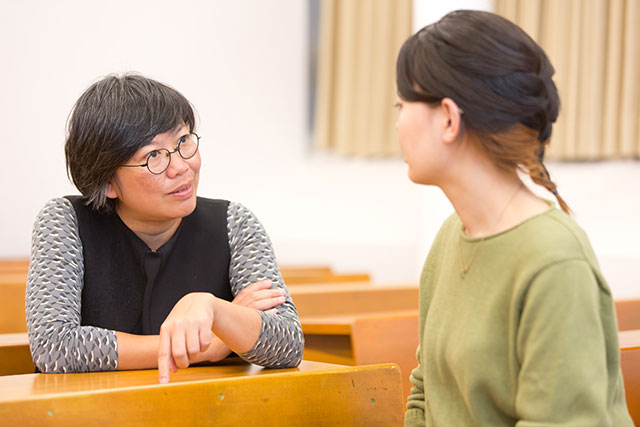
We also have a lot of opportunities to travel abroad, so we can meet people and build our network from whom we can borrow films, or also work with film programmers like Philip Cheah*7 who have a wide network such as the Network for the Promotion of Asia Pacific Cinema (NETPAC) to build our film programs.
*7 Film critic and programmer. Program consultant for the Jogja-NETPAC Asian Film Festival, Eurasia International Film Festival, Shanghai International Film Festival, and Advisor of the Hanoi International Film Festival.
- Next Page
- Film Programming, a Strategy






